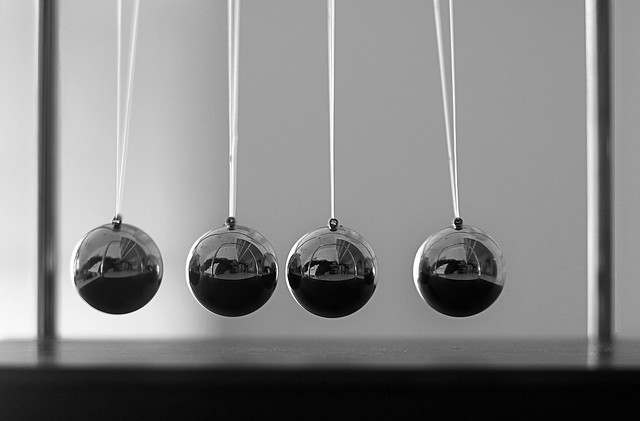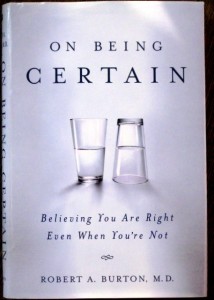
If you have raised a child there is an encounter you are sure to have dealt with. It is the incessantly curious moment.
It is that exchange where every statement you make is met with, “Why?” And after which, each subsequent explanation is met with another, “Why?” And so on. Why? Why? Why?
At some point the exasperated parent blurts out the one word to end all conversation:
“Because!”
“Because.” It is an interesting word. The verb “to be” combined with the verb “to cause”. Or as the old French roots would describe: “by reason of.”
“Because!”
I spend much of my professional life trying to figure out the “because” of things, specifically, the “because” of human thinking and behavior … the “becauses” of thinking a certain way, voting a certain way, giving to a certain institution, joining a certain, dare I say, “cause.”
One thing you quickly discover. Correlation is not cause. It is easy to determine correlation. That is, being able to show that if “this” happens it is very likely “that” will happen around the same time. This is most of the research you see. We sift through the numbers and we see correlations between one phenomenon and another. We even ascribe percentages to it. When this occurs or we take action “A”, then 12% of the time they open the email. But when we do something else and take action “B”, then 16% of the time they open the email. So we show correlation. But was the different action “B” the “be” “cause” of the 4% difference? It is very hard to know.
A long time ago there was a guy named Aristotle. He came up with four ways to think about or look at “causes.” A couple thousand years later, Aristotle’s approach still has value when we think about identifying “cause” in politics, marketing, and social change.
First, there is the material cause. This was the cause determined by the “material that composes the moving or changing of things.” This is the easiest of “causes” to observe and perhaps the most simplistic. It is also the least meaningful. A window broke because a rock went through it. Broken window. Cause = rock. A car engine quit because it ran out of gas. Immobile car. Cause = no gas.
You could say they “caused” the window to break and the car to stop. But were simply materials. They don’t “do” anything. They just enabled something.
It is exactly the same when we ascribe societal or behavior change as the result of a device (iPhone) or an app (GoogleMaps) or a service (Amazon). We say these things are change agents. To be sure change has happened “because” of these things. But they are only a material cause and only give a shallow answer to the “be” “cause” of change.
Second, Aristotle spoke of a “formal” cause. The formal cause results from the arrangement of things. Good examples are the harmonic of a particular musical scale that produces a pleasant sound or the algebraic formula that “causes” an arch to support weight.
Now this gets a bit more interesting. We see it in everyday life. We pay a lot of attention to the “position” of a product or service, whether it is in the supermarket or on a Google search page. Why? Because the “formal cause” or arrangement of things changes an outcome. If you’re selling something you want it to be at the end of the aisle. We pay to have our search term higher up on a page. Yes, these marketing formulas for change work, however often we’re not exactly sure why.
Let’s go further.
Third is Aristotle’s “efficient” cause. This was the cause prompted by a person or change agent. The artist Michaelangelo was the “efficient cause” of the Pieta. You might even say that Hitler was the “efficient cause” of World War II.
Again, we see parallels in assessing the “be” “cause” of developments in business and politics. Einstein. Edison. Jeff Bezos. Elong Musk. Barak Obama. We ascribe to them all manner of causes and changes in politics, society and business. Efficient cause goes beyond substance (the rock or gallon of gasoline), beyond form (the harmonic or equation) to the person or persons who were able to imagine and effectuate change.
Applied to everyday communications, the efficient “cause” are the influencers, the early adopters, the activists, networks and communities that can either make something relevant or irrelevant. So we identify the change agents and chase after them.
Finally there is Aristotle’s – well – “final” cause. This was the ultimate cause. It was and remains the most controversial. It is the cause that is determined by the intrinsic purpose and nature of a particular thing, event or being. As described (in Wikipedia!) it is the cause prompted by “the purpose for which things became.”
Now that’s a phrase to chew on.
Finding the “final” cause of things is the most difficult (and dangerous) but not surprisingly it is the one I find most fun and rewarding. It is finding the “be” “cause” of thinking and action that is due to the intrinsic nature of a person’s being and doing. We talk about it at our agency as the relevant cause. It is looking at things through the eyes, hearts and minds of people and trying to make sense out of the “why” of their attitudes and behavior. And while there, to sift through all the complexity and find out those relevant cause(s) for action.
So the conversation with the little child never ends. After every statement, phenomenon, action, event, or campaign comes the inevitable question: “why?” If we can answer the “why” and find the (be) cause behind those things, we are wiser and can make better decisions about things in the future.
Why?
Well … because!



